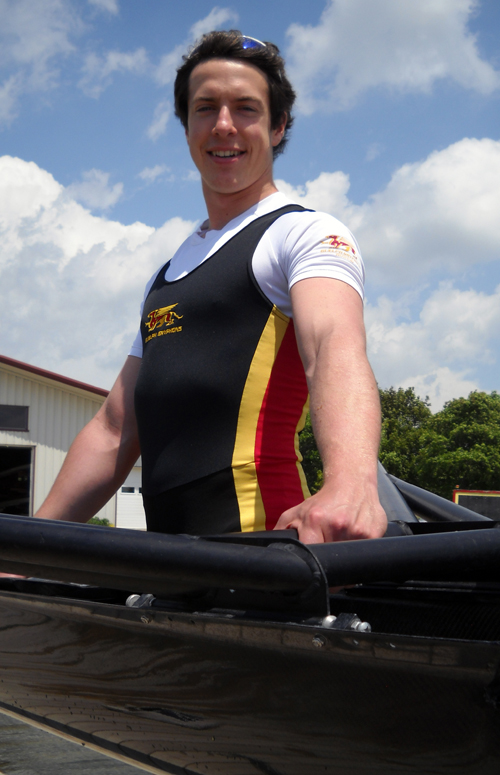
Top three in Ontario. That’s the goal for George Payne and other members of the U of G varsity rowing team in the next few years.
They’re not far off the mark — Guelph has hovered around sixth place in provincial competition and has finished in the top 10 nationally in recent years – and now they hope to nose over the line into medal contention.
To do that, they’ve launched a fundraising campaign to pay for a new mid-weight racing four.
Besides improving the team’s competitive prospects, a new shell will help with training and competition for the entire U of G squad and the city’s rowing club, says Payne, men’s captain for the Gryphon varsity rowing team.
Some 70 rowers – including equal numbers of men and women — are on the U of G team, comprising competitive varsity and novice groups.
Although it competes as a varsity squad, the team is self-funded and relies on fees and fundraising for equipment and other expenses. Gryphon rowers work with volunteer head coach Dave Léger.
A new shell will cost more than $20,000. The team hopes to buy it by this fall.
Last year, they bought their first new boat – a heavyweight four — in a decade. Acquiring that shell helped free up more equipment for other varsity members, a benefit that will also come from purchasing a new mid-weight four shell, says Payne.
He hopes the Gryphons will reach the provincial top three and finish among the top five nationally in the next few years.
In 2012, both men’s and women’s Gryphon rowers finished sixth in Ontario University Athletics (OUA). The squad competes annually at the Canadian University Rowing Championships.
The squad has grown in the past decade, from about 10 varsity rowers and 16 novices in 2003. “No one knew Guelph was a rowing school,” says Payne. “Now we’re becoming competitive, so people want to come to Guelph.”
The varsity squad is part of the Guelph Rowing Club, which numbers 150 to 200 members, including high school rowers. All of the varsity shells belong to the club, apart from boats owned by individual athletes.
High school teams would also use the hoped-for mid-weight racing shell, says Payne.
The rowers train at Guelph Lake, a five-kilometre stretch of open water. U of G is one of a few varsity teams in Canada based at a conservation area.
Payne started rowing at Guelph during his undergrad in biological science. Now working on his master’s degree in Human Health and Nutritional Sciences, he’s among the senior members of the varsity team.
Rowing is notorious for its punishing training regimen, including twice-daily workouts on the water or in the gym. “That’s what people hate about it, but it’s also what sets you apart,” he says. Beginning in the fall, “we wake up at 4:20, we’re at the lake at five, on the water by 5:30.”
Fall training and regattas continue into November. Payne has rowed through snowfalls and has trained on days cold enough to leave icicles hanging off the shells. “That kind of stuff brings you together,” he says.
Still, he prefers warmer training days in early fall.
Early mornings are best on the water, he says. By the time the sun comes up, the rowers have done the hard work and are into their cool-down. “The steam is coming off the water and the boat, and it’s cloudless, and there’s always a great sunrise. It’s pretty spectacular, really.”
For more information, contact rowing@uoguelph.ca.